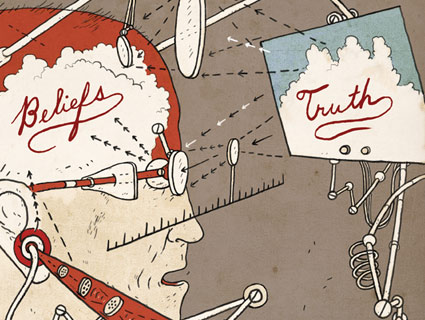
<a href="http://www.flickr.com/photos/jared_g/4024500529/">Jared Greeno</a>/Flickr
Are conservatives more anti-science than liberals? In The Republican Brain, Chris Mooney says they are, and he says this is due to innate temperamental differences between left and right. On Friday I wrote a short post saying I was skeptical about this, and today I’m going to spell out my objections in a little more detail. Tomorrow Chris will reply.
I should make clear at the start that I’m not skeptical of the idea that there are fundamental differences in worldview that drive people to become political liberals or conservatives. Far from it. In fact, I’m on board with this idea completely. I’m quite persuaded that there are a small number of basic cognitive traits that drive a lot of our political differences, and that most of the time we’re not even aware they exist. These traits developed via interactions of both biological evolution and cultural evolution, and they’ve been confirmed by a wide body of research (anthropology, MRI scans, psychological testing, etc.).
So why am I skeptical in particular about the idea that conservative attitudes toward science as a discipline arise from one or more of these innate cognitive traits? I have three reasons.
Reason the first: When you read arguments that conservatives are anti-science, the bill of particulars is often fairly long. But really, there are only two big-ticket items: evolution and climate change. The rest is either small beer or highly arguable. But really, how central to conservative thought can these two things be? After all, mainstream conservative Europeans don’t deny climate science and conservative Catholics don’t deny evolution.
What’s more, conservative suspicion toward both evolution and climate science is pretty easy to explain. Doubt about evolution is obviously bound up with religious belief, which makes it little more than a subset of the fact that conservatives tend to be more literally religious than liberals and American conservatives tend toward the evangelical Protestant strain of literalism.1 And doubt about climate change is obviously motivated by a dislike of the business regulation that would be necessary if we took climate change seriously. So that’s just pure self interest. I really don’t think you need the sledgehammer of innate cognitive traits to explain either of these beliefs. Simpler explanations will do.
Reason the second: There are too many steps involved. If you tell me, say, that conservatives tend to value in-group loyalty more than liberals and are more sensitive to outside threats, I don’t have a hard time buying the idea that this produces high levels of nationalism and support for the military. That’s a
pretty simple extrapolation. But what’s the cognitive trait that makes you anti-science? Not just skeptical of one or two particular results, but skeptical of science in general. You can probably invent a just-so story with two or three steps to get there, but I’d take it with a big grain of salt.
Reason the third: Liberals do it too. Anyone remember the science wars of the ’80s and ’90s? That brawl didn’t get the headlines that climate change and evolution do today, but it was just as big and just as important. And in this case, it was the academic left that was vitriolically opposed to a new and emerging science. In particular, they were opposed to the emerging science of—ta-da!—innate cognitive traits and their effect on human behavior. And the reason the left was opposed to this science (and still is, to some extent) is because they didn’t like some of the conclusions you get when you acknowledge that human cognition is partly determined by biology. This isn’t a perfect analogy to climate skepticism, which has grown even as the science has become more certain, but it shares a lot of the same features.
Movement conservatives are interested in building institutions that provide their followers with reliably conservative answers to social and political problems. That’s hardly a surprise. Likewise, they’re interested in delegitimizing institutions that are either liberal or neutral and therefore don’t provide their followers with reliably conservative answers. That’s also no surprise, and it explains why they attack the institutions of science, mainstream journalism, entertainment, and academia in general.
There’s a complex interplay of biology and culture that produces liberals and conservatives in the first place. But once a conservative movement is in place, it’s inevitable that it will attack conclusions it doesn’t like and institutions that aren’t on board with the conservative agenda. That includes the institutions of science to some extent and a few specific scientific results to a very large extent. But that’s just common sense. I don’t think you need evolutionary psychology to explain it.
1The deeper religiosity of conservatives is probably due in part to some innate cognitive trait. But that’s a separate thing. Skepticism of evolution is just a subset of that cognitive trait, combined with a healthy dose of path dependence within American Protestantism, not the result of some kind of generalized anti-science trait.












